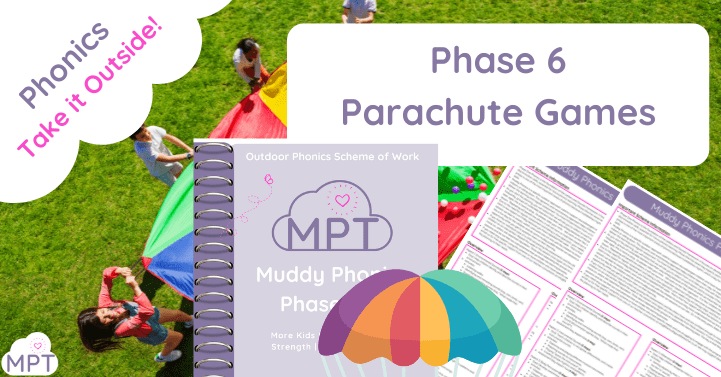Phase 6 Phonics Parachute Games – Active Learning for Confident Readers
Take Phase 6 phonics outdoors with our Parachute Games for Literacy – a dynamic and multi-sensory approach to mastering reading fluency, spelling rules, suffixes, prefixes, tricky words, and sentence-building! These interactive, movement-based activities provide an engaging way for children to reinforce their phonics skills while developing teamwork, coordination, and language confidence.
Key Features:
- Interactive & Engaging: Exciting parachute games designed to enhance spelling, reading fluency, tricky words, and grammar skills.
- Active Outdoor Learning: Encourages physical movement and teamwork while strengthening phonics knowledge.
- Multi-Sensory Approach: Uses sight, sound, and movement to improve word retention and phoneme recognition.
- Social & Teamwork Focused: Encourages cooperation, communication, and problem-solving in a fun learning environment.
- Curriculum-Aligned: Supports Phase 6 phonics objectives from the Letters and Sounds framework and the EYFS/KS1 curriculum.
What’s Included?
✔ 6 structured parachute phonics games, including:
- Suffix Shake-Up – Adding -ing, -ed, -er, -est, and -y
- Prefix Pop – Exploring un-, re-, dis-, and mis-
- Tense Transformation – Changing verbs into past, present, and future tense
- Tricky Word Bounce – Recognizing and spelling common exception words and homophones
- Sentence Scramble – Building complex sentences with conjunctions and adjectives
- Word Hunt Relay – Identifying spelling rules, silent letters, and phoneme patterns
✔ Step-by-step instructions for each game
✔ Adaptable activities to suit different ability levels
✔ Tips for outdoor learning & group play
Benefits for Children:
- Develops reading fluency and confident spelling.
- Enhances understanding of prefixes, suffixes, and tricky words.
- Builds grammar and sentence construction skills.
- Encourages physical activity, teamwork, and problem-solving.
- Provides a fun, engaging alternative to classroom phonics lessons.
Perfect for teachers, home educators, KS1 classrooms, and Forest Schools, these outdoor phonics parachute games make Phase 6 phonics engaging, interactive, and fun!
Phase 6 phonics represents a pivotal stage in a child’s literacy journey, focusing on enhancing reading fluency and spelling accuracy. Building upon prior knowledge, this phase delves into advanced spelling rules, verb tenses, and the application of prefixes and suffixes. By the conclusion of Phase 6, children are expected to read effortlessly and spell a broad spectrum of words with precision.
Core Components of Phase 6 Phonics:
- Advanced Spelling Rules: Children explore complex spelling conventions, such as the transformation of verbs when suffixes are appended (e.g., ‘hop’ becomes ‘hopping’).
- Verb Tenses: Instruction encompasses the past, present, and future tenses, enabling children to modify verbs appropriately based on context.
- Prefixes and Suffixes: Learners are introduced to common prefixes (e.g., ‘un-‘, ‘re-‘) and suffixes (e.g., ‘-ed’, ‘-ing’), enhancing their ability to decode and spell extended words.
- Homophones: The phase addresses words that sound identical but possess different meanings and spellings, such as ‘there’ and ‘their’.
- Proofreading: Children develop skills to review and rectify their writing, ensuring grammatical accuracy and correct spelling.
Benefits of Mastering Phase 6 Phonics:
- Enhanced Reading Fluency: By recognizing complex word structures and applying advanced decoding strategies, children read more smoothly and with greater confidence.
- Improved Spelling Proficiency: A thorough understanding of spelling rules and patterns enables children to spell a wider array of words accurately.
- Expanded Vocabulary: Learning about prefixes, suffixes, and homophones broadens children’s vocabulary, enriching both their oral and written expression.
- Refined Writing Skills: With the ability to proofread and apply correct verb tenses, children’s writing becomes more coherent and grammatically sound.
- Heightened Reading Comprehension: Fluent reading and a robust vocabulary contribute to a deeper understanding of texts, fostering a lifelong love for reading.
Incorporating Phase 6 phonics into early education is crucial for developing proficient reading and writing skills, setting the stage for future academic success.


